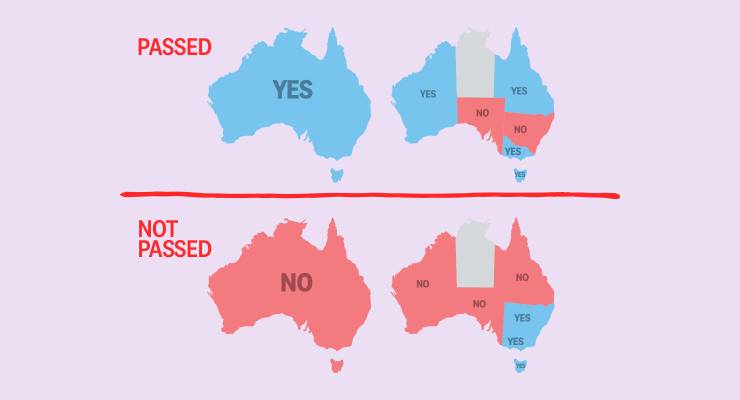
The double majority requirement for the Voice referendum is seldom talked about but has complexities that are not readily apparent. If you didn’t know what it is about, it goes like this: in order for the referendum to pass, a majority of voting-age citizens and a majority of states must agree with the proposition. In other words, the Yes vote requires over 50% of Australians and over 50% in over 50% of states.

In the current situation, therefore, a successful vote for Yes requires a vote of over 50% in the population and in over 50% of the population in four of the six states. The double majority is a significant hurdle to clear; this situation makes it easier for the No campaign to win as it only has to win three states but Yes needs to win four. In a referendum No is the default position; in all other situations than a clear win for Yes, the No case prevails.
There’s another issue with the double majority most people would not consider and I wonder if you have noticed it yet.
Can you see it?
Here we go: in the double majority the two territories don’t count as states.
This is problematic in the case of the ACT; the people who live in our nation’s capital don’t count, their vote has less value than a vote in a state.
In the NT this problem becomes an issue of race.
The NT has a small population, around a quarter of a million, approximately 32% of which, about 80,000 people, are Indigenous. This territory, already remote and isolated — where the most disadvantaged Indigenous peoples live — is facing a partial erasure of their vote. The entire Territory, including 80,000 Indigenous peoples, is being disenfranchised.
In the quite likely situation of the referendum being decided on the four of six states rule, it won’t matter how the people registered to vote in the NT voted. The NT could support the Voice to any proportion, even 100% support, and it won’t count. Any three states could scupper the Voice.
Despite this, the main complaint about the voting process is that an X will not count as a No vote.
I find myself questioning why Liberal Senator and avid No campaigner Jacinta Nampijinpa Price is not concerned by the partial disenfranchisement of the residents of the people of her own state. If her main concern was the voices and rights of Aboriginal peoples from “the bush” surely she would be screaming about this from her state-provided pulpit.
Perhaps, like me, she firmly believes that the Voice will win in the NT and doesn’t want her own people counted. Perhaps she had the same experience as I have and is aware that the Aboriginal peoples of the territory want Yes and she is happy for them to be disenfranchised.
If we are genuinely concerned about the voices of Indigenous peoples from remote communities, as many people claim to be, I have to ask why nobody, except my friends in the NT who brought this to my attention, is concerned about the partial disenfranchisement of 80,000 Aboriginal peoples in the bush.
This article was republished with permission from Claire G Coleman on Post.








It’s frustrating as it’s just a continuing disenfranchisement of our first nation’s people. If only there was some sort of voice that could advocate for change.
Insert smiley face with tears
Interestingly it was the Country Liberal Party that supported a referendum in 1998 to make the NT a state. It was opposed by the (then) Labor opposition and did not pass. Had the right-wingers had their way then, this article would have been redundant.
Not just FNPeoples. All inhabitants of ACT and NT are discriminated against. While we’re at it, why don’t the territories have 12 Senators each, like the Srates? The population of the ACT is not significantly less than Tasmania.
And to those who say Senators are there to represent the States why do they then belong to parties? Shouldn’t they be independent from their House of Reps comrades?
The purpose of the Senate was to give each original State equal representation – initially I think 10 (correct me if I’m wrong) and now 12 senators. It wasn’t until Whitlam came along that the territories got themselves some representation. Why it wasn’t made equal with the states is beyond my knowledge – possibly because the smaller states didn’t want their say diluted too much. Incidentally, it was only just found to be constitutional, the legislation was only found so 4-3 in the High Court.
The parties point is an interesting one. Obviously the constitution doesn’t mention belonging to a political party as a senator. But do senators represent their states interest, or their parties interest?
It is pretty silly to call this ‘systemic racism’ (which is only in the headline I assume written by a sub-editor and not the article author). The same issue would arise in any referendum, regardless of the question asked – race doesn’t come into it. It just so happens that a large proportion of the NT’s population are aboriginal people.
Incidentally the NT voted down becoming a state in 1998, which would have avoided this issue altogether.
Well, one reason why Senator Price may not be concentrating on this matter is that there is absolutely no point in doing so at the present time.
The rules about the majorities required are prescribed by the Constitution. Jumping up and down about it now won’t get that changed and can’t get that changed; it would require a separate referendum to do that.
So those who are concerned with the outcome of the current referendum, whichever side they are on, are quite rightly directing their efforts at that, and not wasting time jumping up and down about something that can’t be changed.
Australia’s version of the American “Electoral College”……………..
……….and probably devised with the same idea in mind.
yes, “the people concerned don’t know what’s good for them”. Perhaps not having a (state) constitution in the NT is of the same rationale
In 1901 wasn’t the Northern Territory regarded as subset of South Australia? At a guess, the entitled white men who squabbled over details of representation didn’t even think of the Territory as it hadn’t been proclaimed an individual colony, didn’t have a parliament, and therefore could be ignored (unlike Tasmania).
The NT was indeed governed by SA in 1901 but it was an expensive loss maker, as it still is. Another Price, then SA Premier Tom Price, gave it to the feds in 1911 thereby boosting the state budget considerably.
I’ve been waiting for a journalist to ask Ms Price about this. Part of her schtick seems to be that Central Australian indigenous people are the only ‘real’ indigenous Australians, so maybe someone needs to pull her up on these very people being partially disenfranchised. Obviously, we have Indigenous Australians here in the ACT as well, who are similarly affected (along with non-indigenous voters like me.
I also wish someone would pull Littleproud (and Price) up about being part of a party created to give rural people a voice in Canberra and having an oversized influence thanks to the LNP coalition.
She may believe they are the only real Australians but she also knows very few NT indigenous will ever vote for her or anything she supports. Therefore she is probably happy they are disenfranchised.
She got into parliament as the CLPs #1 senate candidate. In other words by white conservative voters. The indigenous wont vote for her and they would never recognise her as their voice.